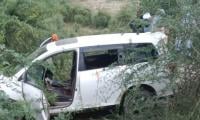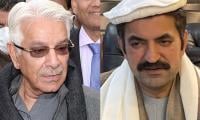ISLAMABAD: Genocide Watch, A US-based organisation, has issued an alert and urged the United Nations and its members to warn India not to commit genocide in Indian Held Kashmir (IHK).
Indian Held Kashmir has been under curfew and lockdown since August 5 after the Indian government abolished Article 370, which granted special status to the valley. The curfew and lockdown has led to protests in the valley with thousands of Kashmiris including Hurriyat leaders placed under house arrest or detained.
“On August 5, the Indian president revoked the Special Autonomous Status of India Administered Jammu and Kashmir under Articles 370 and 35A of the Constitution of India. India has over 600,000 troops in Kashmir. Movement of people and freedom of the press are restricted. India has cut off internet communications,” Genocide Watch said in its alert.
The organisation also gave a list of risk factors for a genocide that are early warnings of massacres in IHK.
1. Prior genocidal massacres and continuing impunity for such killings.
2. Continued armed conflict between Pakistan and India over border areas in IHK.
3. An exclusionary ideology of “Hindutva” - India as Hindu nation - by Modi’s ruling BJP.
4. Authoritarian military rule without legal restraints imposed by civilian Indian officials.
5. Rule by a minority military force (Hindus and Sikhs) over majority Muslim citizens.
6. Cut-off of communications and outside access by internet, media, and trade.
7. Widespread violations of basic human rights - torture, rape, two-year detentions without charge, arbitrary arrests and deportations of Muslim political and human rights leaders.
The genocide alert issued by the Genocide Watch then proceeded to highlight the 10 stages the genocidal process that have been observed in IHK.
The alert stated that the first step is the classification of the population, which pits a Hindu and Sikh Indian Army “us” against the Kashmir Muslim civilians “them”. Symbolisation is the next step of the genocidal process, and Muslims in Kashmir are symbolised by their Muslim names, Kashmiri language, mosques and dressing.
The alert highlighted the role of discrimination, stating, “Hindu Pandits were economically dominant until 1990; BJP reasserted Hindu power.” Genocide Watch highlights the role of “dehumanization” that is played out by labelling Muslims as “terrorists, separatists, criminals and insurgents.”
Organisation is the fifth step, and it refers to the deployment of “600,000 heavily armed Indian Army troops and police”. The genocide alert also highlighted the role of polarisation, wherein Modi and the BJP incite anti-Muslim hatred; and social media spread falsehoods.
The seventh step is preparation, wherein the Indian Army occupied Kashmir, and the BJP leaders speak of the ‘final solution’ for Kashmir. Preparation is followed by persecution, wherein Kashmiri Muslims are locked down and subjected to unlawful arrests, detentions, torture, rape and murder.
The ninth step of the genocidal process is extermination, and the Genocide Watch stated, “Genocidal massacres occurred during Partition; since 1990, there have been at least 25 massacres with death tolls over 25: 10 of Muslims by Indian troops; 15 of Hindus by Muslim militants.”
The last and final step is denial, which refers to the BJP and Modi administration’s rhetoric of scraping away Kashmir’s special constitutional status in a bid to usher in reforms and development. The Genocide Watch stated, “Modi and BJP say their goals are to “bring prosperity” and “end terrorism”; they deny any massacres. No Indian Army troops or police are ever tried for torture, rape or murder. Modi’s takeover is popular in India.”
Meanwhile, UN human rights experts called on India to end crackdown on freedom of expression, access to information and peaceful protests imposed in IHK this month.
The experts expressed concern that the measures, imposed after the Indian Parliament revoked the constitutionally-mandated status of IHK would exacerbate tensions in the region.
Reports have described a near total communications blackout in IHK since the evening of August 04, with internet access, mobile phone networks, and cable and Kashmiri television channels cut off.
“The shutdown of the internet and telecommunication networks, without justification from the government, are inconsistent with the fundamental norms of necessity and proportionality,” said the experts. “The blackout is a form of collective punishment of the people of Jammu and Kashmir, without even a pretext of a precipitating offence.”
The Indian government has also imposed a curfew across IHK, bringing in massive numbers of troops to enforce restrictions on the freedom of movement and of peaceful assembly, particularly in the Kashmir Valley. “We remind the Indian authorities that the restrictions imposed by the Indian government are intrinsically disproportionate, because they preclude considerations of the specific circumstances of each proposed assembly,” said the experts.
At the same time, information received suggests that there has been an increase in the arrest of political figures, journalists, human rights defenders, protesters and others.
The experts said they were deeply concerned by reports that security forces were conducting night raids on private homes leading to the arrests of young people. “Such detentions could constitute serious human rights violations,” the experts said. “The allegations must be thoroughly investigated by the authorities, and, if confirmed, those responsible must be held accountable.
“We are gravely concerned about allegations that the whereabouts of some of those detained is not known as well as the general heightened risk of enforced disappearances, which may proliferate against the backdrop of mass arrests and restricted access to the internet and other communications networks,” added the experts.
They also expressed serious concern about the use of excessive force against protesters, including the use of live ammunition, which could amount to violations of the right to life. “India has the responsibility to use the minimum force necessary when policing protests,” the experts said. “This means that the use of deadly force is a measure permissible only as last resort and to protect life.”
The UN experts: David Kaye (US), Special Rapporteur on the promotion and protection of the right to freedom of opinion and expression; Michel Forst (France), Special Rapporteur on the situation of human rights defenders; Bernard Duhaime, Chair-Rapporteur, Working Group on Enforced or Involuntary Disappearances; Clement Nyaletsossi Voule, Special Rapporteur on the right to peaceful assembly and association; Agnes Callamard, Special Rapporteur on extrajudicial, summary or arbitrary executions.
The special rapporteurs and working groups are part of what is known as the Special Procedures of the Human Rights Council. Special Procedures, the largest body of independent experts in the UN human rights system, is the general name of the Council’s independent fact-finding and monitoring mechanisms that address either specific country situations or thematic issues in all parts of the world. Special Procedures experts work on a voluntary basis; they are not UN staff and do not receive a salary for their work. They are independent from any government or organisation and serve in their individual capacity.
Meanwhile, separatist leaders in IHK have urged people to defy ban and join a mass march after Friday prayers today (Friday), the first such call since the Indian government revoked the region’s autonomy, stirring anger in the region and beyond.
Hundreds of political leaders and activists, many of them separatists seeking Kashmir’s secession from India, have been incarcerated and the appeal to the public came through posters that appeared overnight in the region’s main city of Srinagar.
“Every person, young and old, men and women, should march after Friday prayers,” the Joint Resistance Leadership, which represents all major separatist groups, said on one poster.
The public must march to the office of the UN Military Observer Group in Srinagar, which was set up in 1949 after the first war between Pakistan and India over Kashmir.
Crowds have demonstrated frequently in Srinagar despite a ban on public gatherings and the severe restriction of phone and internet services. One of the posters said India planned to change the demographics of Kashmir by flooding it with outsiders and urged clerics to speak about these fears during their sermons on Friday.
In the Soura part of Srinagar, where protests have flared, some residents said that they would try to join the protests.
“We will try, people will try to go,” said one middle-aged man, who declined to be identified, after reading a poster pasted at a crossroads near the area’s main mosque. “But we don’t know if they will let us,” he said.
In the Zainakadal area of Srinagar’s old quarter, where all shops were shuttered, and few people roamed, residents said they hadn’t heard of the call for protests. “If our leaders call, we will come out,” said a man, who also declined to be identified. “There will be protests, our protests won’t stop.”
JUI-F filed a petition through advocate Kamran Murtaza
New data from 187 countries shows that the estimated number of deaths from viral hepatitis increased from 1.1 million...
APTMA also drew the attention of the finance minister toward high taxes and persistent delays in refunds have squeezed...
The guard appeared at the Westminster Magistrates Court on Wednesday afternoon with his lawyer Moeen Khan
Ogra determines the natural gas tariff for domestic sector consumers and LNG price separately for power sector
The chief minister directed prompt completion of the Lahore Ring Road SL-3 project and urged immediate action







